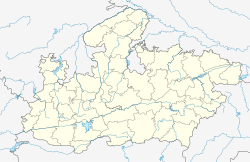Top Qs
Timeline
Chat
Perspective
Seondha
Town in Madhya Pradesh, India From Wikipedia, the free encyclopedia
Remove ads
Seondha is a town and nagar panchayat in the Datia district of Madhya Pradesh, India. It is situated along the banks of the Sindh River and is known for its historical and spiritual significance. The town features an old fortress dating back to the Datia era and lies close to the sacred Ratangarh Temple, about 15 km away. Nearby, the Sankua Kund waterfall holds religious importance in Hinduism, where it is believed that the Four Kumaras — Sanaka, Sanandana, Sanatana, and Sanatkumara — are still meditating in their child forms.
Remove ads
Geography
Seondha is located at 26.16°N 78.78°E.[1] It has an average elevation of 152 metres (498 feet). The town lies on the banks of the Sindh River.
Climate
Seondha experiences a warm and temperate climate. Winters are dry, while summers bring significant rainfall. According to the Köppen–Geiger classification, Seondha has a Cwa climate type. The average temperature is 26.0 °C, and the annual rainfall is approximately 881 mm. The driest month is April, with about 2 mm of rainfall, whereas August records the highest average precipitation of 305 mm.
Remove ads
Demographics
As per the
,[2] Seondha had a population of 19,540. Males constituted 55% and females 45% of the population. The average literacy rate was 60%, higher than the national average of 59.5% — male literacy at 69% and female literacy at 49%. Around 16% of the population was under six years of age.
History
Sankua is a well-known site in Seondha, where a large melā (fair) is held on Purnima (the full moon day) following Diwali. On this occasion, devotees take a holy dip in the Sindh River.
Origin of the Poddar Community
Seondha is historically regarded as one of the origin places of the Poddar community. According to local historical accounts, members of the Poddar family were originally known as Guptas. The title “Poddar,” meaning *treasurer* or *keeper of wealth*, was conferred upon a distinguished Gupta who served as the royal treasurer in the court of the King of Seondha. Over generations, the descendants of this family adopted “Poddar” as their surname. Many families bearing the Poddar title trace their ancestral roots back to Seondha, and the town remains an important part of the community’s cultural heritage.
Remove ads
See also
References
Wikiwand - on
Seamless Wikipedia browsing. On steroids.
Remove ads

